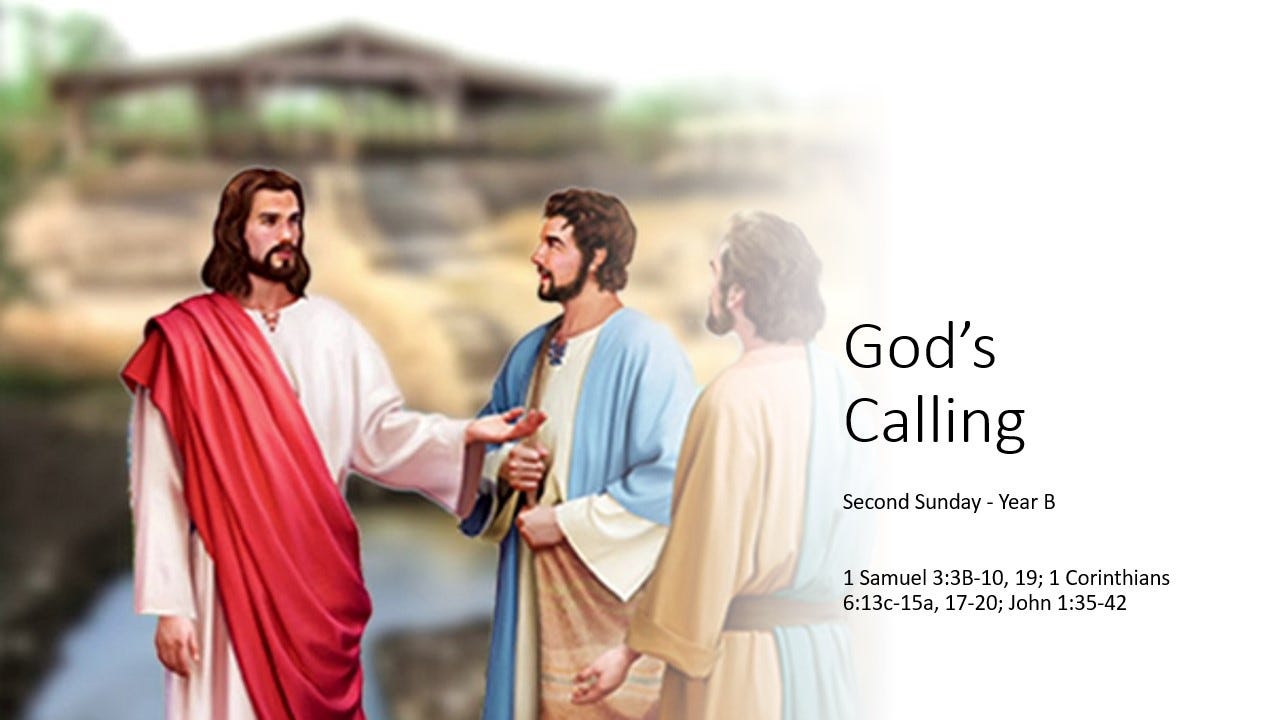God’s Calling
Second Sunday - Year B
1 Samuel 3:3B-10, 19; 1 Corinthians 6:13c-15a, 17-20; John 1:35-42
The theme of the liturgy of the Word is a vocation. Samuel, the first disciples of Christ, and the Corinthians are called to serve God. However, to realize this fact, they need guides in faith. In the first reading, Eli understands that the Lord calls young Samuel and so teaches him how to respond to God's voice. In the Gospel, John the Baptist directs the disciples' attention towards Jesus, and in the second reading, Saint Paul makes the Corinthians aware of their mistaken notion of Christian morality.
Eli, John the Baptist, and the apostle Paul were mature people and possessed enormous experience in life and faith. Eli, as a priest, spent all his life caring for the ark of the sanctuary of God and at the time of Samuel’s call, he was already retired (1 Sam. 1:3). John the Baptist was finishing his mission of witnessing to the light (John 1:8). There was one more task left to fulfill, namely to make the world aware that no power is above the law. He would pay for it with his life. Finally, Saint Paul has undergone a profound spiritual change. The one who persecuted Christ became his most faithful servant (Phil. 3:5-11).
Samuel, Andrew, John, Peter, and the Corinthians were either young or neophytes on the path of faith. About Samuel, the Scripture says that "he did not yet know the Lord, and the word of the Lord had not been revealed to him yet" (1 Sam. 3:7). To Jesus' question, "What do you seek?", the disciples answered: "Master, where do you live?" (John 1:38). Finally, the charismatic community at Corinth - the first fruit of the Gospel in the Greek province of Achaia - still did not understand the requirements of following Christ. They were divided among themselves, did not understand the mystery of the Eucharist, misinterpreted the truth about the resurrection, and some even led an immoral lifestyle. All of them, inexperienced in matters of faith and morality, needed spiritual guides who would lead them to God and holiness.
The path of vocation sketched in today's Liturgy of the Word goes through three stages. The first stage is represented by young Samuel. God is unknown to us, and the word of the Lord has not yet been revealed to us. The second stage is represented by the first disciples of Jesus - following Christ. Finally, the third stage is symbolized by the Corinthians. This is the stage of deepening our faith and grasping the correct understanding of what it requires of us. At each of these stages, we need spiritual guides. Someone must show us the beauty of the Holy Scriptures, arouse our fascination with Christ, and teach us (catechize) the obligations of Christian moral standards. Only in this case, we will be able to answer God’s call with the words of the Psalmist: "Here I am, Lord; I come to do Your will "(Ps. 40:8a.9a).


